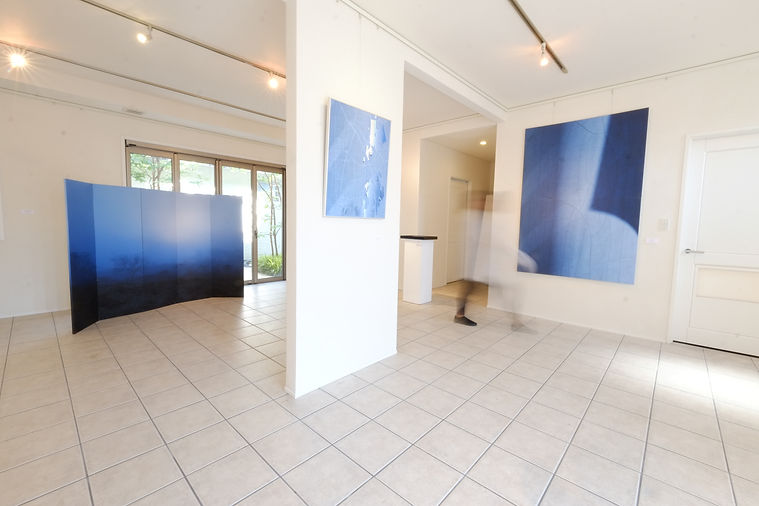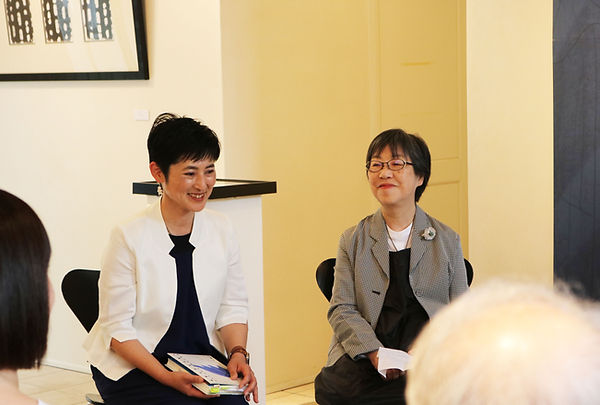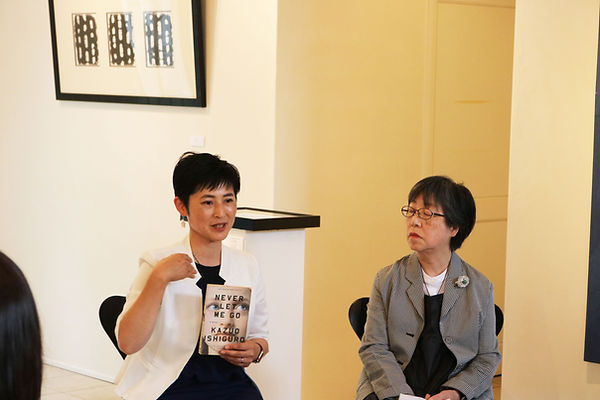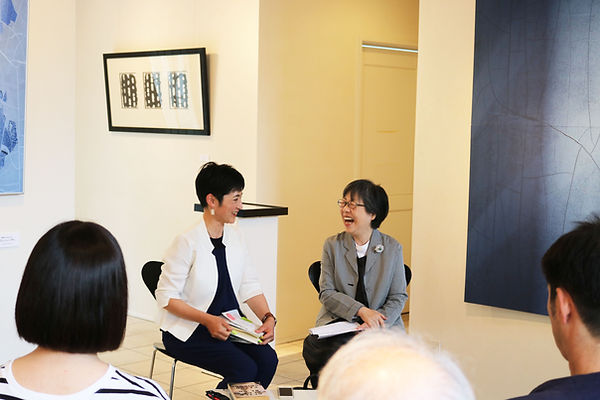ARTIST TALK
Solo Exhibiiton Camera Mia
Interview with Yoko KUNIHIRO

Natsoumi:
Ladies and gentlemen, thank you for coming to the talk today. I am the photographer Natsoumi.
Kunihiro:
My name is Yoko Kunihiro. I used to teach sociology at university, but I retired at 68, eight years ago, so now I am relaxing. I live in Yokohama, and I’ve never met Natsoumi before, but I had the opportunity to visit her today. Natsoumi is a generation younger than me, but I am an art lover and am happy that we share some common ground.
Natsoumi:
I work as a photographer, and my work is not intended to be appreciated rapidly in a single glance. I photograph what comes into my mind as if I were writing a diary entry, so it's not something I necessarily want to show to people. However, I've repeated the process of re-telling an intimate moment or a day that I want to relive, and the result is the work that is hanging here today (Build Space: a gallery in Shiogama, Miyagi Prefecture). How did you come to know Kunihiro? Was it when she was giving a lecture at the Yoshino Sakuzo Memorial Museum in Osaki, Miyagi Prefecture?
Kunihiro:
That was about four years ago.
Natsoumi:
That's right. The title of the lecture was ‘How to live happily in the future in the age of centenarians.’ At that time, I was having a hard time raising my children, and I couldn't do my housework, or photography in the way I wanted to. I couldn't see where I belonged, so attending the lecture was desperately important to me. Listening to her lecture, I was very encouraged when I came to the realisation that even when things don't go well, we can find enjoyment and meaning through repeated trial and error. How did you get into research?
Kunihiro:
I started my postgraduate studies when I was 40 years old. After graduating from university, I went to work for a company, got married and had a child relatively early. There weren't many nurseries then, so I left my first child with my mother and worked. However, when my second child was born, my mother told me that she could no longer help me, so I decided to quit my job. That was when I was 31. After that, I wanted a full-time job, but there was no way I could find another job, so I worked as a freelance writer and editor while raising my children. My husband told me I was a ‘gypsy housewife’ when I quit my job and became a housewife. I was writing essays at the time and my husband's term ‘a rolling housewife’ (rolling stone metaphor) somehow seemed to fit, so I published a book entitled ‘A Rolling Housewife’. At the time, it was unusual for a housewife to publish a book and overnight I attracted lots of attention from newspapers and magazines. I wrote it from my perspective as a housewife, despite having studied hard at university and I wondered why my life had taken this turn. Then I contracted uterine fibroids, which made it impossible for me to work as a writer or editor. At the time, the average life expectancy was around 80 years old, so I was worried about how I would live on like this for another 40 years, which spurred me to go to graduate school. Back then, the terms feminism and gender were largely ignored or unheard of, but I found a graduate school where I could study these subjects. A female professor encouraged me to write my doctoral thesis on ‘housewives and gender’. That was when I was 49 years old.

Natsoumi:
The awareness of being seen as a housewife, but not considering herself as a housewife, in her book stems from the public’s gaze and their response to her work, as well as the reinforcement of social stereotypes, i.e. ‘the social perception of you as a housewife’. ‘In other cases, husbands and daughters may represent this social gaze’ (quote from The Housewife and Gender, by Yoko Kunihiro). Can you tell us what it means to liberate women from being housewives and how they might go about it?
Kunihiro:
To be honest, when I was working full-time, I saw women talking to each other after taking out the rubbish and I thought housewives were people with no time on their hands. This is a selfish image, but I couldn't bear to be seen in this way when I actually became a housewife myself. It's hard work raising children and doing housework there's so much to do, but the world thinks of you as a nobody. So, I asked the people around me who were in a similar situation, ‘Do you consider yourself to be a housewife?’ and they replied, ‘I'm a housewife but I don't want to think of myself as a normal housewife.’ In other words, to liberate yourself from the perception of worthlessness as a housewife, you need to be able to brush off social stereotypes that you may have internalized yourself.
Furthermore, Japanese society considers married women as ‘housewives’, regardless of whether they work full-time or not. Therefore, we have to change society’s perception, in order to understand and invalidate the whole term ‘housewife’. I thought I could dismantle the term in this way.
Natsoumi:
That's right. Many of my works are photographs of landscapes and things that are outside my consciousness expressed through photography. One of my early series of photos - Fortuné Island - which explores the landscapes of Fukushima, is one such example. I started living in Fukushima in 2010, after I returned from Paris. When I saw the landscape of Aizu, surrounded by snow, mountains and lakes, with fog rolling in amongst the cedar forests, I felt it was a world away from the Swiss landscapes overlooking Mont Blanc. The original elements of Japanese landscapes were all there in a condensed, concentrated form and it felt like another world to me. At that time, I was pigeonholed as a ‘housewife’, I had a miscarriage and then became pregnant again, but the baby did not grow due to infertility issues. My husband, who was worried about my physical health, stopped me from taking photographs, but I felt strongly that I wanted to photograph the landscape and people of Okuaizu, Fukushima Prefecture. The landscape overlapped so much with my own mental landscape at the time that I felt safe, as if I had become a baby and re-entered the womb of a snow chamber. I was determined to take photos, whether I was labelled as a ‘housewife’ or not, and I continued to return and shoot the series over and over again. When my child was finally born, I felt very frustrated because people around me told me that I shouldn't be taking photos, that my child might not grow up properly, or that my ‘hobby’ wasn't good enough. I was really frustrated that I, a professional journalist in France, was married, dependent on my husband and living mainly to raise my child. So, one day, I named all the countless chores I was doing, measured the time it took to complete each one with a stopwatch and then made a list of them. That was the point at which I realised that housework and childcare is like doing a night shift for a nurse, especially when the children are very young. My husband totally underestimates the challenges of parenting and says things like, "I work hard out there and taking care of the baby seems like a breeze." He doesn't realise that parenting is a full-time job that demands my constant attention and a huge amount of effort. I fed my child with the blood of breast milk, and I used to get dizzy and lose a lot of weight each month. I couldn't eat, or even go to the toilet as much as I would have liked. As for the housework, I modified my chores for each family member in relation to my maternal responsibilities, available time and energy levels. This is how housewives carry out their work while ignoring their bodies and even suffering physically, but I believe there is far too little recognition of this. I was very doubtful that this should be done for free and as a matter of course in the name of ‘motherly love’. One day, I declared to my husband that I wanted to be the head of the household and when I went to the city hall to ask, the official said, ‘anyone can be head of the household’, so I did so at that point [Traditionally in Japan, the husband runs the household and women often feel they do not have the necessary skills to be head of the household.]. Then I started to feel that I wanted to be the head of my own household and I started to feel more positive and was able to devote myself to photography. Sometime later, I was approached by a large gallery and a Tokyo camera manufacturer to hold a solo exhibition, and I was able to announce proudly, ‘I am a photographer’.

Kunihiro:
In our case, my husband did the housework as a matter of course and we had a rota system. However, if you don't have an income, you assume you’re just supported by your husband and it becomes difficult to escape that situation. I soon became the head of the household. Some people tend to write their father's name instead of their own in the parent/guardian section on school forms, but I think just putting it in your own name makes a big difference to your outlook and self-empowerment. The government used to estimate the annual income from housework and it's a significant amount of money. Unfortunately, housewives don’t actually receive it, so I think it's important to share and simplify the housework as much as possible instead of one person doing it all. It’s also important to do away with the misconception that women are happy as long as they simply keep quiet and raise their children. Children are cute and childcare is very important, but I don’t think it’s good for society if women have nothing to do after their children have grown up.

Natsoumi:
I also want to focus on my artwork, so I try to keep my housework simple. I was originally born left-handed, but my grandmother made me become right-handed and now I can only write and eat with chopsticks with my right hand. However, when I take photographs, I look through the viewfinder of the camera with my left eye and see things in the world as I see them with my right brain. The reason I started taking photographs of electricity poles is because I have always felt that the role given to women is fixed, like electricity poles, and that they form the backbone of society’s infrastructure. When you see an electricity pole you don't think, ‘this pole is cool!’, do you? In Europe, there are almost no electricity poles because the power lines are hidden underground so as not to spoil the landscape. In Japan, on the other hand, after World War II, the burnt-out country experienced rapid economic development and electricity poles were erected to cope with the massive demand for electricity during this postwar period of rapid economic growth. In a capitalist, patriarchal hierarchical society, where men were the patriarchs and worked outside the home while women stayed at home and did the housework, this style was very efficient. As the number of households increased, so did the number of electricity poles. It is estimated that there are about 550,000 poles, both large and small, which is equal to the number of households in Japan. Each of these poles overlapped in my mind with the image of a stay-at-home mother and it sparked my inspiration for a series of films called Ubiquité [Ubiquity]. This photograph shows a reflector on an electricity pole, which has faded in the sun and is no longer even reflective. At the time, I was photographing the image of a mother who was assigned a specific role, which mirrored with my own. The yellow and black reflectors, which signify a warning, have been damaged over time, exposing their original material - aluminium. In other words, what used to reflect the light shining from outside has become so damaged, it now shines itself - as aluminium. I photographed this image because I felt that it reflected my own decision to assert myself as a householder. I would like to ask you, doctor, about the so-called ‘pink-collar jobs’ - nurses, childcare workers, secretaries, carers, housekeepers, etc. - that are predominately done by women. What is the difference between a housewife and someone with a manual job, or what kind of lifestyle would enable women to lead more fulfilling, empowering lives?

Kunihiro:
I think ‘pink collar jobs’ are jobs where women work for low wages doing what they do at home for free, but low wages do not represent the value of the work they do and after the Covid pandemic, people all over the world finally realised that these people do the most important jobs. They finally grasped the fact that society could not function without them, and yet the low salaries, lack of recognition and social status of these people have not evolved. I think that is utterly wrong. I believe that if such work were deemed to be important, housewives would be empowered, and men would also be inspired to do things around the house. Society must appreciate that there is value in housework and that it should be valued. However, women are convinced it is their duty to work for next to nothing and do the work that is an extension of housework that women have traditionally done at home for free. The quickest way to change this is through political policies, but men control Japanese politics. The media and major advertising agencies are almost all headed up by men. If you look around the world, the UN and other major global organisations are setting goals to change these values, but Japanese politicians focus on making money and building weapons. It is difficult to change their values, so I sincerely hope there will be more female politicians in the future.

Natsoumi:
I believe that photography exists as a link between the world of words and the world of reality. When I lived in Paris, I often went to ateliers to talk to artists, took portraits and wrote articles, but I was often asked to make stereotypical images of Paris. I had a solo exhibition here at Buildspace 12 years ago, and after coming full circle I am back here again. Photography makes it possible to communicate with everyone without words. People often ask me, ‘What kind of camera do you use?’ or ‘What kind of technique do you use?’. They think I have a special technique, but personally, I think that a photographer's eye is more important than anything else. I believe photography is a way of presenting the world as I see it. The art industry is also dominated by men, but I think that people like me, who make work whilst raising children, have the opportunity to have an unusual perspective. I consider this in the same light as a world that is predominantly right-handed, I have a chance to make my left-handed side come alive. Going back to the first point, I think your idea that ‘it is not about having a plan and getting there, but about repeating setbacks and learning’ is really the starting point of photography. With painting, you evoke a mental image and create work from that inspiration moving in one direction all the time, but with photography, you need a subject to take a picture of, so it's all about how you capture what you see in the moment from your own fresh perspective. It's a continuous presentation of ‘this is what I see’.
I like the Nobel Prize-winning author Kazuo Ishiguro, and one of his novels is Never Let Me Go. It describes a world in which diseases will be eradicated. There is another person who is a genetic copy of you and if you are found to have cancer, for example, you can detect it at an early stage and continue living with the organs from your genetic twin. People who live in the outside world live and travel freely, but the donors live in a boarding school, where they grow up being told that they are special and compassionate. I thought this is exactly what a ‘mother’ is. The children there live fixed in the same place. When people living in the outside world get sick, they donate their organs and eventually die. The world there is freshly depicted in a way that you cannot see if you are not fixed in one place. For example, beautiful landscapes that you couldn't see if you were driving in a car, scenes after the rain, moments of sunshine, or just casually rubbing shoulders with friends and having a good time - these scenes are described in detail in a fixed space. I felt that the perspective from which Kazuo Ishiguro looks at the outside world from a hermetically sealed world and how he looks at the inside of a closed world in an indifferent and detailed way is similar to the perspective from which I take my photographs. The search for efficiency in capitalism creates divisions where some people can move freely, and others are trapped. In light of this repetitive scenario, I hope to create work that bridges the divide through photography, without words.

Yoko KUNIHIRO
Based in Yokohama, she serves as Professor Emeritus at Musashi University and Director of the Center for Women and Politics at the Ichikawa Fusae Memorial Foundation. She holds a Ph.D. in Sociology, with research centered on gender, media, and women's political participation. She began graduate studies at 40 and started her university career at 50.
Building on her academic pursuits, her publications include "Housewives and Gender" (2001), co-edited "Television and Foreign Images: A Study of Media Stereotyping" (2004), "Media and Gender" (2012), co-authored "Television as a Memory" (2013), "Work-Life Imbalance in Television Journalism" (2014), and "The Reality of Television Program Production Companies" (2022).
